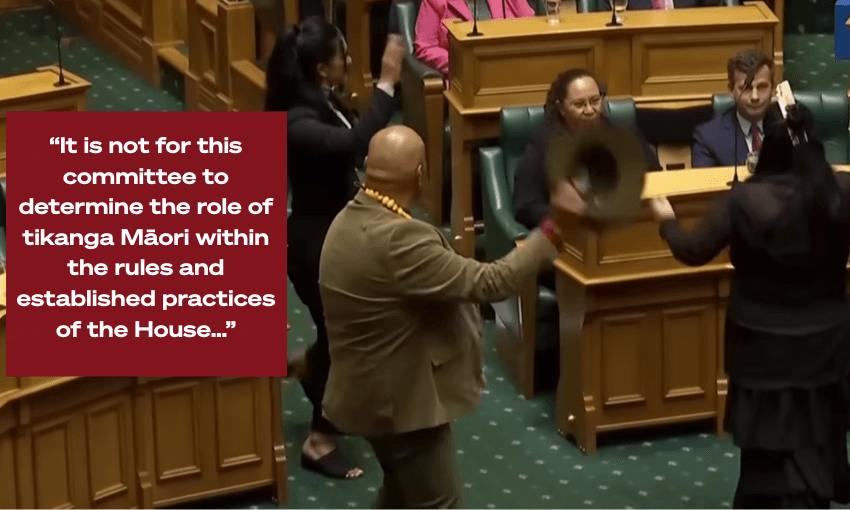Parliament’s privileges committee has reminded everyone why it is customary to call it ‘powerful’ by suspending three Te Pāti Māori MPs for the haka heard around the world. But, what exactly were they punished for again?
Listening to Judith Collins on RNZ’s Morning Report, it seemed clear why she (and the other governing party MPs making up a majority on the privileges committee) thought it necessary to hand down an “unprecedented” 21-day suspension to Te Pāti Māori co-leaders Rawiri Waititi and Debbie Ngarewa-Packer.
“To try and stop and interrupt a vote of parliament while members of parliament are trying to cast their votes in a debate is an extremely serious matter. We have not done this lightly,” she said.
That’s fine, in so far as it goes. But, there’s a couple of problems with this explanation for the committee’s decision and related sanction. First of all, here’s what the privileges committee decided unanimously just two months ago in respect of a fourth MP who participated in the haka, Labour’s Peeni Henare:
“Mr Henare’s conduct in stepping on to the floor of the chamber to participate in the haka while a vote was being taken did obstruct or impede the business of the House, as the vote was not able to continue. Our view is that this is undoubtedly disorderly behaviour. However, we find that Mr Henare’s actions do not amount to a contempt.”
So, why were the actions of Te Pāti Māori MPs in delaying the vote on the Treaty Principles Bill such an egregious contempt that they deserve the heaviest sanction ever handed down, while the actions of Peeni Henare weren’t even regarded as being a contempt at all? After all, the four combined together to “try and stop and interrupt a vote of parliament”, yet three get heavily punished for doing so while one isn’t even found “guilty” of any contempt at all.
Secondly, and perhaps more seriously, the privileges committee majority didn’t actually say that they were punishing the MPs just for “stopping and interrupting a vote of parliament”. Rather, they claimed “there is no question” that the actions of Te Pāti Māori MPs while conducting the haka “could have the effect of intimidating other members”. That’s because, to get to the floor of the House to perform the haka, Te Pāti Māori MPs walked past and then stood before (or, “approached”) the Act Party’s MPs.
Saying there is “no question” that having a haka performed in front of you could be “intimidatory” seems a bit out of touch with contemporary New Zealand understandings. You might think that some serious engagement with tikanga – the meaning and purpose of haka as a performative mode of communication – is required before reaching such a conclusion. However, this engagement was something that the majority of the privileges committee resolutely turned their faces against: “It is not for this committee to determine the role of tikanga Māori within the rules and established practices of the House…” As such, the haka was reduced to nothing more than some loud chanting and gestures done in the face of MPs the participants disagreed with, potentially causing those MPs to feel physically intimidated.
That unquestioning acceptance of the intimidatory nature of haka also seems out-of-step with the constant claim that the House of Representatives is a place for “robust debate”. This is the standard defence given every time there is TV coverage of MPs shouting invectives at each other across the floor, often to the point where the words of the person speaking on a matter cannot be heard. Politics is adversarial! Emotions run high!! Being an elected representative means being tough enough to take the licks and still keep on fighting the good fight!!! And so on, and so on.
All of which might lead one to ask whether the committee’s decision and sanction was not (just) about the haka performed last December. Rather, as the committee majority notes, “we intend to leave members in no doubt that the behaviour discussed is not acceptable, and that the intimidation of other members of the House is treated with utmost seriousness”. A translation of this might be that the governing majority of MPs are demanding that Te Pāti Māori will “respect my authoritah” by complying with the rules of parliament as they see them as being, or else.
Whether the committee’s stance then has much of a disciplining impact on Te Pāti Māori’s MPs remains to be seen. After all, there’s not much that an opposition MP actually can achieve in the House anyway. You can’t win any votes. And making speeches or asking questions of ministers is only as effective as the publicity that it gets. All of which pales in comparison with the attention that the protest haka received – amplified now by the martyrdom granted to those who had the temerity of practicing their culture on behalf of those who elected them.




